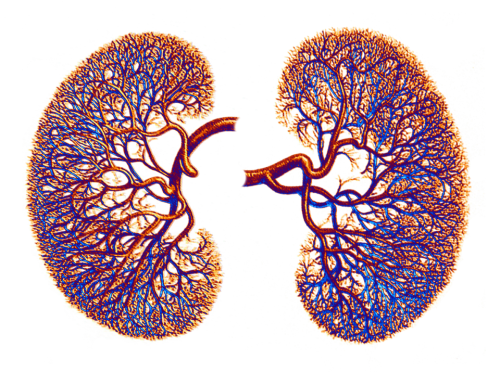Diet and CKD Progression

One in seven adults in the U.S. has chronic kidney disease (CKD).* Kidney disease develops when kidneys lose their ability to remove waste and maintain fluid and chemical balances in the body. The severity of CKD depends on how well the kidneys filter wastes from the blood. It can progress quickly or take many years to develop.
Education is the key to prevention
The more you know about CKD, the more you can do to help slow its progression. If you have early stage CKD, there are many ways to protect your kidney health, such as controlling diabetes and high blood pressure (the two biggest causes of kidney disease), avoiding high fat foods and use of newer hypoglycemic agents and new blood pressure drugs. Choosing healthy, kidney-friendly foods is another good way to manage early stage CKD.
Plant-Based Eating and CKD
Some studies have shown that a plant-based diet may help slow the progression of kidney disease in people with CKD and may reduce glomerular filtration rate (GFR). (1) (GFR is a number that doctors use to measure kidney function. Learn more about GFR and the Stages of CKD here.)
Recent studies support the idea that a low-protein diet is one of the best ways to manage CKD. Plant-based diets may improve gut health and help control nitrogen balance, acid-base metabolism and bone mineral disorders. In addition, vegan and vegetarian diets are higher in potassium, which can helpcontrol high blood pressure. Also, since plant-based diets have more fiber that allows only a small amount of potassium to be reabsorbed (2), it can help you avoid having high potassium, or “hyperkalemia.”
Learn more about Medical Nutrition Therapy
Medical Nutrition Therapy(MNT) is an evidence-based medical approach to treating certain chronic conditions through the use of an individually-tailored nutrition plan. Many providers and patients are unaware that MNT is a covered benefit for earlier stages of CKD in some health plans. (3) If you’re interested in exploring MNT to treat early stage CKD, talk to your doctor or medical provider.
Using MNT during the early stages of CKD can help slow its progression and improve health outcomes (4). The Kidney Disease Outcomes Quality Initiative (KDOQI) 2020 Nutrition guidelines recommend MNT for people with CKD stages 1-5 Non-Dialysis to improve outcomes (5).
Connect with a dietitian
There are many Registered Dietitian Nutritionists (RDNs) currently providing CKD diet education in the United States. Use the links below to find one near you.
National Kidney Foundation-CKD Database
Academy of Nutrition and Dietetics, Renal Dietitians Dietetic Practice Group
Medical Nutrition Therapy is covered by Medicare, and Medicare Advantage Plans cover 100% for CKD stages 3-5 non-dialysis, diabetes and 36 months post-kidney transplant. Have your health care provider refer you to a kidney or renal dietitian as soon as possible. Most commercial insurance plans cover medical nutrition therapy for a variety of health conditions and/or general nutrition. Contact your health insurance company to see what your plan covers.
Get started incorporating more plants in your diet
Looking for ways to add more plant-based foods to your diet? You can find many plant-based, kidney-friendly recipes at DaVita.com. You can also sign up for a free myDaVita account and download more than 30 free Today’s Kidney Diet cookbooks, including “Plant-Based Eating.”
*Source: 2017 CDC National Center for Chronic Disease Prevention and Health Promotion
REFERENCES:
- Joshi S, Kalantar-Zadeh K, Chauveau P, Carrero JJ. Risks and Benefits of Different Dietary Patterns in CKD. Am J Kidney Dis. 81(3):352-360
- Mocanu CA, Smionescu TP, Mocanu AE, Garneata L. Plant-Based versus Animal-Based Low Protein Diets in the Management of Chronic Kidney Disease. Nutrients 2021,13,3721
- Jimenez EY, Kelley K. Schofield M. et al Medical Nutrition Therapy Access in CKD: A Cross-sectional Survey of Patients and Providers. Kidney Med. 2020;3(1):31-41
- De Waal F, Heaslip E, Callas P. Medical Nutrition Therapy for Chronic Kidney Disease Improves Biomarkers and Slows Time to Dialysis. J Ren Nutr. 2016;26 (1):1-9
- Ikizler TA, Burrowes JD, Byham-Gray LD, et al:KDOQI Nutrition in CKD Guideline Work Group. KDOQI clinical practice guideline for nutrition in CKD: 2020 update. Am J Kidney Dis. 2020; 76 (3) (suppl 1): 51-S107
Additional Kidney Diet Resources
Visit DaVita.com and explore these diet and nutrition resources:
DaVita Kidney-Friendly Recipes
This article is for informational purposes only and is not a substitute for medical advice or treatment. Consult your physician and dietitian regarding your specific diagnosis, treatment, diet and health questions.

Recent Comments